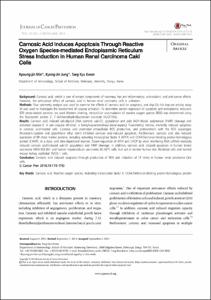Carnosic Acid Induces Apoptosis Through Reactive Oxygen Species-mediated Endoplasmic Reticulum Stress Induction in Human Renal Carcinoma Caki Cells
- Keimyung Author(s)
- Kwon, Taeg Kyu
- Department
- Dept. of Immunology (면역학)
- Journal Title
- Journal of Cancer Prevention
- Issued Date
- 2014
- Volume
- 19
- Issue
- 3
- Abstract
- Background: Carnosic acid, which is one of extract components of rosemary, has anti inflammatory, anti-oxidant, and anti-cancer effects. However, the anti-cancer effect of carnosic acid in human renal carcinoma cells is unknown.
Methods: Flow cytometry analysis was used to examine the effects of carnosic acid on apoptosis, and Asp-Glu-Val-Asp-ase activity assay kit was used to investigate the involvement of caspase activation. To determine protein expression of apoptotic and endoplasmic reticulum (ER) stress-related proteins, we used Western blotting. Intracellular accumulation of reactive oxygen species (ROS) was determined using the fluorescent probes 2', 7'-dichlorodihydrofluorescein diacetate (H2DCFDA).
Results: Carnosic acid induced sub-diploid DNA content, sub-G1, population and poly (ADP-ribose) polymerase (PARP) cleavage and activated caspase-3. A pan-caspase inhibitor, a benzyloxycarbonylvalyl-alanyl-aspartyl fluoromethyl ketone, markedly reduced apoptosis in carnosic acid-treated cells. Carnosic acid promoted intracellular ROS production, and pretreatment with the ROS scavengers (N-acetyl-L-cysteine and glutathione ethyl ester) inhibited carnosic acid-induced apoptosis. Furthermore, carnosic acid also induced expression of ER stress marker proteins, including activating transcription factor 4 (ATF4) and CCAAT/enhancer-binding protein-homologous protein (CHOP), in a dose- and time-dependent manner. Down-regulation of ATF4 and CHOP by small interfering RNA (siRNA) markedly reduced carnosic acid-induced sub-G1 population and PARP cleavage. In addition, carnosic acid induced apoptosis in human breast carcinoma MDA-MB-361 and human hepatocellular carcinoma SK-HEP1 cells, but not in normal human skin fibroblast cells and normal mouse kidney epithelial TMCK-1 cells.
Conclusion: Carnosic acid induced apoptosis through production of ROS and induction of ER stress in human renal carcinoma Caki cells.
- Keimyung Author(s)(Kor)
- 권택규
- Publisher
- School of Medicine
- Citation
- Kyoung-jin Min et al. (2014). Carnosic Acid Induces Apoptosis Through Reactive
Oxygen Species-mediated Endoplasmic Reticulum Stress Induction in Human Renal Carcinoma Caki Cells. Journal of Cancer Prevention, 19(3), 170–178. doi: 10.15430/JCP.2014.19.3.170
- Type
- Article
- ISSN
- 2288-3649
- Appears in Collections:
- 1. School of Medicine (의과대학) > Dept. of Immunology (면역학)
- 파일 목록
-
-
Download
 oak-bbb-02715.pdf
기타 데이터 / 2.09 MB / Adobe PDF
oak-bbb-02715.pdf
기타 데이터 / 2.09 MB / Adobe PDF
-
Items in Repository are protected by copyright, with all rights reserved, unless otherwise indicated.